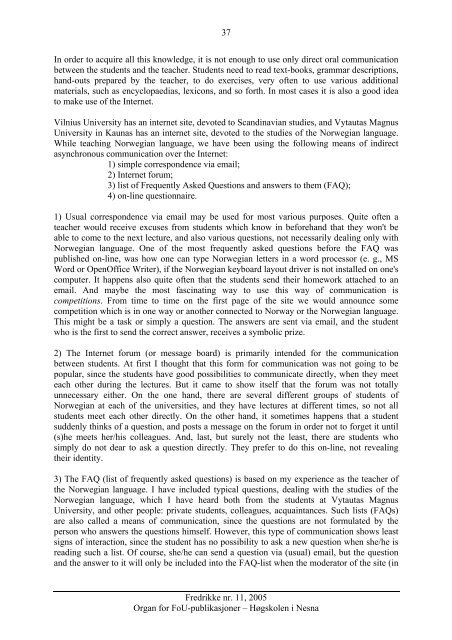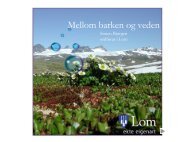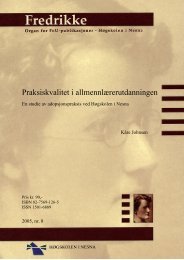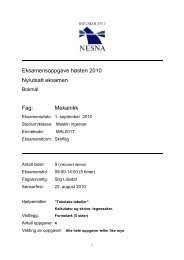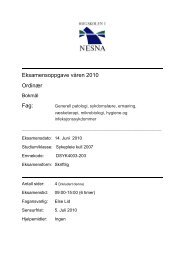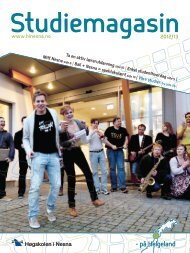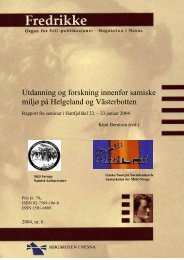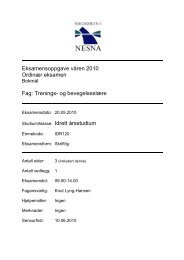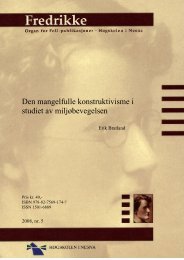ikt-basert norskundervisning i utlandet - Høgskolen i Nesna
ikt-basert norskundervisning i utlandet - Høgskolen i Nesna
ikt-basert norskundervisning i utlandet - Høgskolen i Nesna
Create successful ePaper yourself
Turn your PDF publications into a flip-book with our unique Google optimized e-Paper software.
37<br />
In order to acquire all this knowledge, it is not enough to use only direct oral communication<br />
between the students and the teacher. Students need to read text-books, grammar descriptions,<br />
hand-outs prepared by the teacher, to do exercises, very often to use various additional<br />
materials, such as encyclopaedias, lexicons, and so forth. In most cases it is also a good idea<br />
to make use of the Internet.<br />
Vilnius University has an internet site, devoted to Scandinavian studies, and Vytautas Magnus<br />
University in Kaunas has an internet site, devoted to the studies of the Norwegian language.<br />
While teaching Norwegian language, we have been using the following means of indirect<br />
asynchronous communication over the Internet:<br />
1) simple correspondence via email;<br />
2) Internet forum;<br />
3) list of Frequently Asked Questions and answers to them (FAQ);<br />
4) on-line questionnaire.<br />
1) Usual correspondence via email may be used for most various purposes. Quite often a<br />
teacher would receive excuses from students which know in beforehand that they won't be<br />
able to come to the next lecture, and also various questions, not necessarily dealing only with<br />
Norwegian language. One of the most frequently asked questions before the FAQ was<br />
published on-line, was how one can type Norwegian letters in a word processor (e. g., MS<br />
Word or OpenOffice Writer), if the Norwegian keyboard layout driver is not installed on one's<br />
computer. It happens also quite often that the students send their homework attached to an<br />
email. And maybe the most fascinating way to use this way of communication is<br />
competitions. From time to time on the first page of the site we would announce some<br />
competition which is in one way or another connected to Norway or the Norwegian language.<br />
This might be a task or simply a question. The answers are sent via email, and the student<br />
who is the first to send the correct answer, receives a symbolic prize.<br />
2) The Internet forum (or message board) is primarily intended for the communication<br />
between students. At first I thought that this form for communication was not going to be<br />
popular, since the students have good possibilities to communicate directly, when they meet<br />
each other during the lectures. But it came to show itself that the forum was not totally<br />
unnecessary either. On the one hand, there are several different groups of students of<br />
Norwegian at each of the universities, and they have lectures at different times, so not all<br />
students meet each other directly. On the other hand, it sometimes happens that a student<br />
suddenly thinks of a question, and posts a message on the forum in order not to forget it until<br />
(s)he meets her/his colleagues. And, last, but surely not the least, there are students who<br />
simply do not dear to ask a question directly. They prefer to do this on-line, not revealing<br />
their identity.<br />
3) The FAQ (list of frequently asked questions) is based on my experience as the teacher of<br />
the Norwegian language. I have included typical questions, dealing with the studies of the<br />
Norwegian language, which I have heard both from the students at Vytautas Magnus<br />
University, and other people: private students, colleagues, acquaintances. Such lists (FAQs)<br />
are also called a means of communication, since the questions are not formulated by the<br />
person who answers the questions himself. However, this type of communication shows least<br />
signs of interaction, since the student has no possibility to ask a new question when she/he is<br />
reading such a list. Of course, she/he can send a question via (usual) email, but the question<br />
and the answer to it will only be included into the FAQ-list when the moderator of the site (in<br />
Fredrikke nr. 11, 2005<br />
Organ for FoU-publikasjoner – <strong>Høgskolen</strong> i <strong>Nesna</strong>


